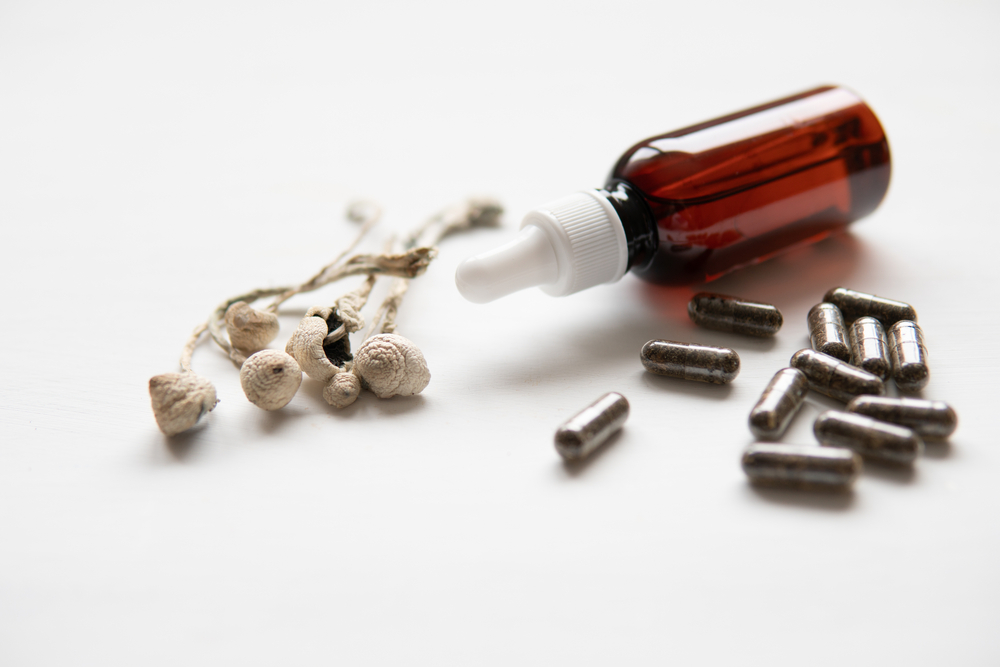Microdosing Psychedelics Could Revolutionize Mental Health Treatment
Posted on Categories Discover Magazine

When you think of psychedelic drugs like psilocybin or lysergic acid diethylamide (LSD), you might imagine an array of mind-boggling visuals. Yet psychoactive substances can be good for more than just a tremendous trip. For thousands of years, they’ve been used to treat psychological disorders and promote well-being. In fact, when taken in small doses, experts say they can even produce comparable effects to antidepressants.
Called microdosing, this idea is nothing new, but it’s taken off in popularity over the last several years. Scientists are pushing for more clinical trials to investigate how microdosing can impact our serotonin levels. But, existing studies have already shown that psychoactive substances could change the game for mental health treatment.
“We see people report greater levels of mindfulness, greater connectedness, reduced stress,” says Joey Rootman, a doctoral student at the University of British Columbia. “All these types of things can unfold within the microdosing experience.”
How Does Microdosing Impact the Brain?
The most popular drugs used by microdosers — mescaline, LSD, and psilocybin, the active compound in so-called magic mushrooms — are defined as classical psychedelics. This means that they target our serotonin system, which regulates our mood.
Classical psychedelics target a specific type of serotonin receptor in the brain, which temporarily increases the amount of serotonin. This not only gives users a greater sense of euphoria that is commonly associated with serotonin boosts but also slightly modifies how we view the world around us.
“It’s not that [classical psychedelics are] necessarily creating some sort of whole new perceptual world, but more so that, by influencing our serotonin system, [they] can just tweak those levels of those different kinds of perceptive ‘clickers’,” Rootman says. “And by doing so, [they] impact our perception of the world.”
Read More: Psychedelic Effects on the Brain
What Do Studies Say About Microdosing Psychedelics?
In larger doses, this can lead to the visual effects and “mystical experience” commonly associated with psychedelics. But even in small amounts, these drugs are still influencing the serotonin system, which can lead to other positive effects.
Rootman says participants in a study he recently conducted reported feeling greater connectivity, greater mindfulness, and reduced stress after microdosing. Published in Nature in 2021, the study surveyed about 4,000 microdosers and 4,000 non-microdosers about their well-being via a mobile app.
In recent years, microdosing has attracted attention for its potential to treat individuals with mental health disorders that also impact the serotonin system, such as anxiety or depression.
Psychologists aren’t yet clear on whether psychedelics use the same pathways to ease mental health symptoms as antidepressants, which are typically prescribed for treatment. But studies have shown it can be just as effective — one systematic study published in 2019 saw participants report an increase in mood, attention, wellbeing, and overall psychological functioning on days they microdosed.
With both full doses of classical psychedelics and microdosing, Rootman says, “there is some sort of behavioral psychological context in which it’s supporting recovery from mood and anxiety disorders, which isn’t captured within our typical antidepressants.”
Read More: Do Psychedelic Drug Therapies Actually Require Getting High?
Barriers to Researching Psychedelics
Still, there are few clinical trials that have shown conclusive evidence of the benefits of microdosing.
With so few clinical trial results available, one of the biggest questions that remains unanswered is whether an individual’s expectations or preconceived notions about psychedelics can impact their microdosing experience. Clinical trials currently in progress will likely be able to provide answers by including a placebo control group.
Studies like Rootman’s, however, haven’t been able to administer placebos, pointing instead to the need for more thorough research. Existing studies have also struggled to collect large enough sample sizes.
Indeed, in a study published in the Journal of Psychopharmacology in 2022, researchers found that microdosing psilocybin didn’t affect emotion processing or symptoms of anxiety and depression compared with a placebo — and affirmed that, for now, evidence on the efficacy of microdosing as a form of mental health treatment is still inconsistent.
“Further research in a substance-naïve population with clinical range anxiety and depressive symptoms is needed to substantiate the potential beneficial effects of microdosing,” the study authors concluded.
Read More: Psychedelics Could Be the Future of Psychotherapy
Article Sources
Our writers at Discovermagazine.com use peer-reviewed studies and high-quality sources for our articles, and our editors review for scientific accuracy and editorial standards. Review the sources used below for this article: